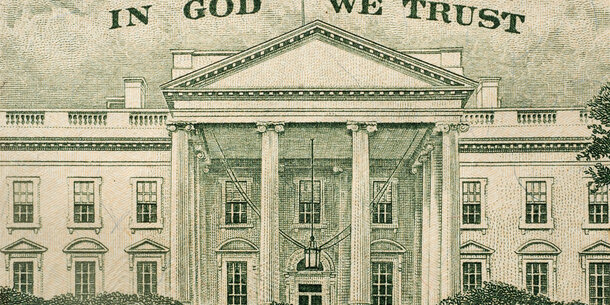The 2020 election wasn’t just historic for its turnout — it also cost an arm and a leg. In fact, it was the most expensive federal election on record. Yet apparently the Trump campaign is in a hole.
According to Open Secrets, the price tag for the federal election was just shy of a whopping $14 billion, double the previous presidential election cycle. The spending was split between $6.6 billion for the presidential race and $7.2 billion for the Congressional contests. Meanwhile at the state level an additional $2.5 billion was spent in state elections for candidates and ballot measures, according to Follow the Money.
Democrats outspent Republicans at the federal level, with Democrats spending $6.9 billion. This was buoyed by the spending of two billionaire candidates in the Democratic presidential primary, Tom Steyer and Michael Bloomberg. Meanwhile the Republicans spent $3.8 billion. And in contrast to 2016 when candidate Trump partially self-funded, in 2020, candidate Trump put zero of his own dollars into his own re-election effort.
Joe Biden was a particularly successful fundraiser. According to the FEC’s filings, between April 1, 2019 and October 14, 2020 his campaign raised over $950 million. That includes a staggering $364 million in August and another $383 million in September. To put those figures in perspective, Trump’s 2016 campaign raised $333 million for the entire campaign. Biden’s total outpaced the more than $600 million raised by Trump over four years. And this does not account for any last-minute fundraising by either candidate between October 15 and Election Day.
In case you were curious, Kanye West’s puzzling run for president raised $11 million and spent $10 million. In the end, he only ended up on the ballot in 12 states and garnered around 60,000 votes nationwide. That works out to roughly $151 per vote just to lose badly. By contrast, in 2016 Trump spent $5.80 per vote in 2016 and Obama spent $12.80 per vote in 2012 to win. The cost per vote for 2020 is still not final because California and other states are still counting ballots.
The last presidential election was an outlier. Before 2016, every presidential election was more expensive than the previous one. But in 2016, it was less costly than the 2012 election. In 2016, Trump scrambled campaign finance expectations when he — the candidate who raised less money — won the presidency against a better financed Hillary Clinton. But 2020 looks more like other federal elections where typically the better financed candidate — in this case Biden — wins.
2020 was also the 100th anniversary of the 19th Amendment, which gave women the vote and produced a woman as the vice president-elect for the first time. Fittingly, contributing to the high fundraising totals in 2020 was the political spending of American women. According to Fortune, more women made big political donations than ever before. NPR similarly reported in September that “this election cycle, the share of women giving money to political campaigns has already risen to 43.5% after never topping 28% in the 1990s.” And female donors favored Democrats in their giving in 2020.
Currently, the states are still finalizing their vote counts for official certification, but Joe Biden appears to be the president-elect with over 270 likely Electoral College votes. President Trump has not conceded and is trying to litigate the results of the election in several states in the court. Trump’s 2020 campaign is soliciting money from donors to help pay for this litigation effort, which adds to the price tag of the 2020 election. Biden is also fund raising to defend his electoral win in court against Trump’s far flung litigations.
As eagle eyed commentators noticed, when the Trump campaign solicited money for its post-election litigation, the fine print noted that 50 to 60 percent of the funds would not go to the legal fights but rather to retiring the campaign’s debts. This is curious since according to the campaign’s latest filing with the Federal Election Commission, between January 2017 and October 2020 the campaign had raised $601 million and spent $565 million — which should leave the campaign in the black. But the filing also indicates that the campaign had $1.2 million in loans or debts. It is possible that between October 15 and the election that the campaign blew through its cash reserves and is even more in debt that the $1.2 million listed with the FEC.
The final price tag for the 2020 election will actually balloon to be even larger because the final post-election reports to the FEC are not yet due. Those reports, which are filed 30 days after the election, will show the final totals including the 11th hour scurry for cash for both presidential campaigns.
The views expressed are the author’s own and not necessarily those of the Brennan Center.






